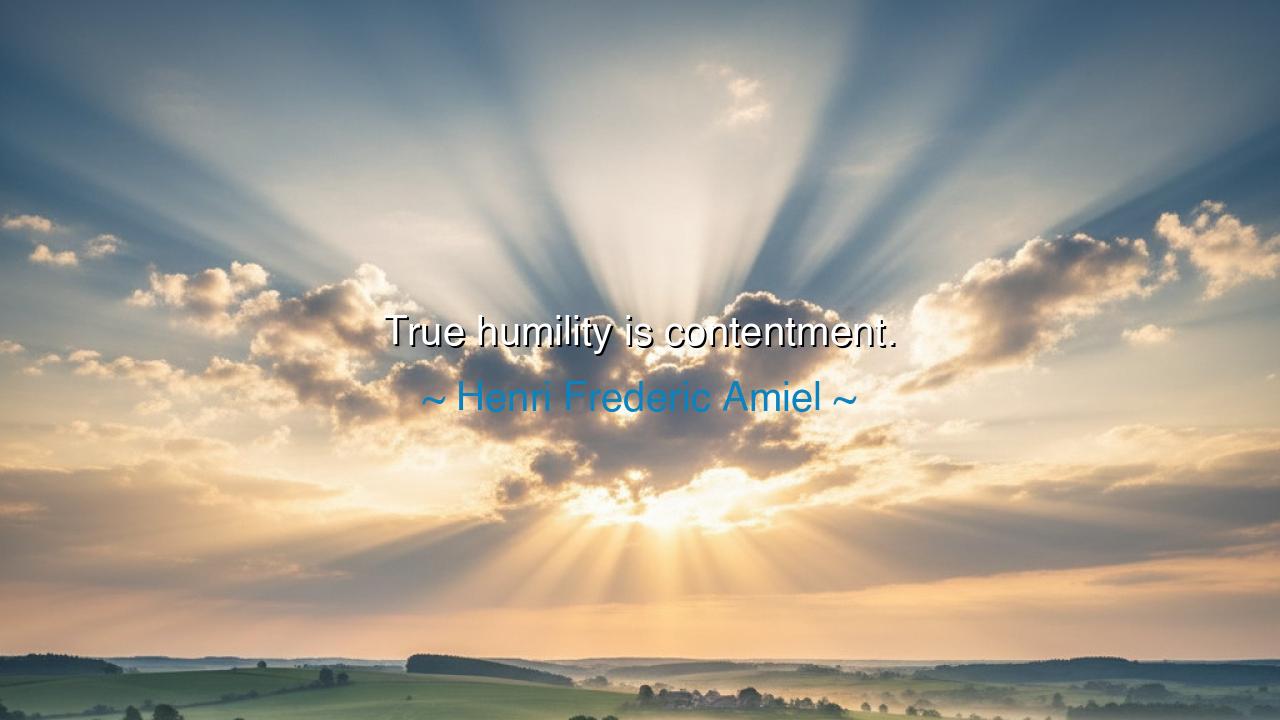
True humility is contentment.






“True humility is contentment.” Thus spoke Henri Frédéric Amiel, the philosopher of Geneva, whose meditations pierced into the quiet chambers of the human soul. In this brief yet profound phrase, he reveals the secret bond between two virtues: humility, which bows the heart before the truth of existence, and contentment, which rests in gratitude rather than endless striving. To be humble is not merely to think lowly of oneself, but to be at peace with one’s lot, neither envious of the greater nor disdainful of the lesser. To be content is to drink deeply from the cup one already holds, without thirsting for another.
When Amiel declares that true humility is contentment, he reminds us that pride often disguises itself as ambition, as hunger, as dissatisfaction. Pride whispers that what one has is never enough—that others have more, deserve less, and that only by grasping higher can the soul be satisfied. But the humble heart knows another way: it accepts what is given, labors faithfully within its portion, and rejoices in simple blessings. This acceptance is not weakness—it is strength, for it cannot be shaken by envy or greed.
History bears witness to this truth. Consider Diogenes the Cynic, who cast aside possessions and lived in a barrel, declaring that he was richer than kings because he desired nothing he did not already have. His humility before life gave him the contentment that emperors could not buy. When Alexander the Great offered to grant him any wish, Diogenes asked only that the conqueror step aside and stop blocking his sunlight. This is the wisdom Amiel echoes: humility is not self-hatred, but the freedom of contentment, which makes a man richer than conquerors.
On the other hand, history also warns us of the opposite. Napoleon Bonaparte, who rose from obscurity to rule empires, was never content. His ambition was boundless, his pride insatiable. Though he conquered kingdoms, he could not conquer his own desire, and thus he fell—first at the snows of Russia, then at Waterloo. His greatness was shattered by the lack of humility, for without contentment, his hunger consumed him. Amiel’s words stand here as judgment: he who cannot be content will never know peace, no matter how high he climbs.
The connection between humility and contentment also speaks to the common life. In families, in work, in friendships, how often is peace lost because the heart is restless, always comparing, always demanding? But when one practices humility—accepting limits, rejoicing in small joys, being grateful rather than envious—then contentment reigns. And in contentment, harmony is born. This is why Amiel’s teaching is not only philosophy but practical guidance for daily living.
The lesson is clear: if you desire humility, learn contentment. Do not measure yourself by others, nor despise what is small. Be grateful for food, for shelter, for companionship, for work honestly done. Seek improvement, yes, but without pride’s poison—strive without envy, labor without greed, aspire without disdain. To live this way is to carry humility not as a burden, but as a crown of peace.
Practical wisdom flows from this truth: each day, practice gratitude. Speak aloud the blessings you already hold. When pride stirs discontent, remind yourself of what is already in your hands. Learn to rejoice in others’ success without bitterness, and to accept your own portion with grace. For this is the path of freedom. The humble and the content are not chained by endless desire; they walk light and unafraid, for nothing can rob them of the peace they already carry within.
Thus let Amiel’s words endure: “True humility is contentment.” For humility without contentment is only pretense, and contentment without humility is only complacency. But together, they form the still heart that no storm can shake, the wealth that no thief can steal. Seek this union, and you will find a treasure greater than crowns or kingdoms: the quiet strength of a soul at peace with itself and the world.






AAdministratorAdministrator
Welcome, honored guests. Please leave a comment, we will respond soon